No Echo Read online
Page 4
At the age of eighteen he had reluctantly reconciled himself to the idea that he was gay. It would not prevent him from reaching the goals he had set for himself. On his twentieth birthday – after a puberty filled with competitive sports, soccer, and incessant wanking – he decided never to tell anyone, never to show anything that might betray what would cause his father to kill himself, if he ever got to hear. His father had sailed with Shetlands Larsen during the war, and had been highly decorated for his efforts for his homeland. In the fifties and sixties he had worked for the Police Security Service. That was when Communists lurked in every trade union, and the Cold War was truly icebound. Severin was an only child and a daddy’s boy, and only once did the façade crack, when he had attempted to chat up Billy T. He was solicitously rejected, and since then Billy T. had never uttered a single word about the episode.
The Head of Security Services had been forced to resign in the wake of the Furre scandal, when Berge Furre, a respected historian and former Socialist Left politician, was himself investigated by the Security Service while serving on the Lund Commission, set up to look into the activities of the self-same Security Service. This resulted in the appointment of the first female boss of the Police Security Service, though her tenure proved short-lived. Before she left, though, she had managed to summon Severin Heger to her office and declare: “It’s not a security risk that you’re gay, Severin. What’s suspicious is that you put so much energy into hiding the fact. Give in. Look around you. We’re approaching a new millennium.”
Severin recalled that he had stood up without giving an answer. Then he had gone home, slept for a long time, got up, taken a shower, and, smelling sweet, had paid a visit to the gay club Castro that same evening. After spending a night making up for lost time, he requested a transfer to the Crime Section. His father had died two years earlier. Severin Heger finally felt liberated.
“All we know for certain are the following—”
He tapped his fingers one by one on the edge of the table.
“The body is Brede Ziegler. Born 1953. Recently married. Childless. When he was killed, he had a wallet with more than sixteen thousand kroner in banknotes on his person. Sixteen thousand, four hundred and eighty-two kroner and fifty øre, to be painfully precise.”
“Sixteen thous—”
“Plus four credit cards. No less. AmEx, VISA, Diners and MasterCard. Gold and silver and platinum, and God knows what.”
“That sends the robbery motive up in smoke,” Karianne murmured.
“Not necessarily.”
Severin Heger adjusted his glasses.
“The thief might have been surprised by passers-by before he got hold of the loot, so to speak. But if it was a thief, he chose a strange murder weapon. A Masahiro 210.”
“A what?”
Karianne swallowed the sugar cube she had been sucking.
“So he was really stabbed to death? A Massa-what?”
“Masahiro 210. A knife. An expensive, beautiful knife. It should really have been listed in the weapons register. A particularly dangerous kitchen implement.”
“That was what the kitchen boy was talking about,” Silje Sørensen said eagerly. “They were each to get one at Christmas or something!”
Billy T. gave Karianne a vexed look.
“If you can’t be bothered coming to the meetings, but are instead more preoccupied with interviewing peripheral witnesses, then for God’s sake you’d better find out exactly what was said.”
“But … it was actually you who turned up late—”
“Cut it out. We discovered that yesterday.”
He forced out a smile. Karianne chose to interpret it as some kind of apology, but did not relinquish eye contact until he averted his eyes and pressed on: “By yesterday morning, a message was relayed from Forensics informing us that it said ‘Masahiro 210’ on the knife blade. We should have had that information right away. Sunday night. As soon as they pulled the knife out of his ribcage. Maybe sometime in the next thousand years we’ll manage to get those bloody medics to understand that they need to communicate with us.”
“You were fast asleep then,” Karianne muttered, barely audible.
Severin Heger stood up and flung out his arms dramatically.
“My friends. Greatly esteemed colleagues. How can we possibly solve this case if we’re more obsessed with cutting one another’s throats?”
“I’m very happy – no problems!”
Silje Sørensen smiled broadly and raised her coffee cup in a toast. She was a newly qualified officer from that year’s litter, and delighted to have landed right in the middle of the Crime Section. Her fellow-students were plodding the streets in the uniformed branch.
“You, yes. But our Chief Inspector here …”
He put his hand on Billy T.’s shoulder, but Billy T. shook him off.
“… he’s in a terrible mood. I don’t know why, but it really isn’t very productive. And you, dear lady …”
He pointed his finger at Karianne Holbeck and drew a spiral in the air.
“… you seem to be going through a somewhat delayed revolt against authority at the moment. Is it hormonal or what? PMS perhaps?”
Karianne blushed deeply and was about to protest. Billy T. gave a smile, a far more genuine one this time.
“Dare I suggest that we call a truce, that Karl puts down his dainty handiwork, that somebody puts on more coffee, drinkable this time, and that I am then permitted to sit down quietly to share a bit more of my knowledge about the murder weapon with this truly eminent, if rather grumpy, group of investigators?”
He smiled at each and every one of the six others in the room. Karianne’s face was still bright red. Silje Sørensen concealed a smirk behind her hand. On her ring finger sparkled a diamond that must have been worth half a police officer’s annual salary. Karl hesitated, but in the end folded his pocket knife and stuffed the pipe into his jacket pocket. Annmari Skar, the Police Prosecutor, who until this point had been sitting immersed in her documents and obviously could not care less about the whole debacle, stared at him with a look he was not quite sure how to construe. Then, to his surprise, she burst into peals of laughter.
“You’re a treasure, Severin. You really are a treasure.”
Sergeant Klaus Veierød had already headed for the coffee machine.
“How many want some?”
“All of us,” Severin said mildly. “We all want coffee. So—” He resumed his seat and took a deep breath.
“It says something else on the blade of the knife.”
He leafed through his papers and held a slip of yellow paper up to his face.
“I really must learn to use my glasses. ‘Molybdenum Vanadium Stainless Steel’. In plain Norwegian that means something like aerospace steel. Strong and unbelievably light. Monobloc. All the classiest restaurant kitchens have such knives. These are considered to be the hottest. The best. They cost one thousand and twenty-five kroner and eighty-two øre, to be exact, at GG Storkjøkken, the catering suppliers in Torggata. In other words, you’re unlikely to find this sort of knife in our canteen here.”
He pointed at the ceiling with his thumb.
“Anyway, Entré uses these knives exclusively. The problem is that so do ten or twelve other restaurants here in the city. At least. Incidentally, the knife blade measures two hundred and ten millimeters. Eighty-two of them were inside Ziegler’s body. The tip had only just perforated the pericardium.”
He fell silent. No one said a word. The hum from the dilapidated ventilation system was giving Billy T. the beginnings of a headache, and he rubbed the bridge of his nose.
“Light,” he said with a sigh. “The knife is also extraordinarily light?”
“Yip. I called in at GG’s yesterday to feel one. It’s unfortunately outwith my budget, but my God, what a knife! I’ve always thought Sabatier was the only acceptable brand, but now I know better.”
“Light,” Billy T. repeated, grimacing this time. “In
other words, we can’t exclude a female killer.”
“We can’t do that anyway,” Karianne said, clearly straining not to appear ungracious. “I mean, a knife doesn’t ordinarily weigh so much that a woman couldn’t wield it as a murder—”
“Or a child,” Billy T. interrupted pensively.
“Exactly. The weapon actually tells us very little, other than that the killer is either extremely well off or belongs to the restaurant fraternity.”
The blush crept over Karianne’s face again. She ran her finger vigorously across one cheek, as if trying to wipe it away.
“The restaurant fraternity,” Karl reiterated. “Or someone who simply wanted it to look like that.”
“As usual.”
Billy T. stroked his neck with his pass as if he were shaving.
“But of course it’s quite encouraging all the same—”
Silje Sørensen had raised her hand in the air, though that wasn’t necessary.
“I mean, it would’ve been a lot worse if the knife had been from IKEA or some such. There has to be a far more restricted number of these knives here in Norway, doesn’t there? Do we know anything about fingerprints?”
“Yes,” Severin Heger said. “Though Forensics are dilatory as usual, I’ve put a rocket under Kripos to get an answer. Nothing found as yet. The handle is clean, apart from some blood and trace fibers of fine paper. Wiped with a paper handkerchief, if you ask me.” Since responsibility for the scientific and technical aspects of police work had been centralized at Kripos, Norway’s National Criminal Investigation Service, obtaining the results had become a notoriously slow process.
“And I am,” Billy T. said. “How long is the DNA-analysis going to take?”
“Too long. Six weeks, they’re saying now. But I’ll get that cut down as much as possible. Also, they haven’t found any other stab wounds on Ziegler’s body. However, there were fingerprints on the syringe. Kripos are running them through our records. I don’t think we should raise our hopes too high. But apropos of nothing, Forensics said something about Ziegler’s complexion being an odd color. The doctor asked whether he was a drinker. Do we know anything about that?”
They all stared at Karianne, who had been assigned responsibility for coordinating the tactical investigation. She shook her head gently.
“We’ve conducted twenty-four interviews and I still couldn’t say whether or not the man was a drinker. This new system whereby we record the interviews on tape is all well and good, but it becomes fairly difficult when there aren’t enough people to type them up. There are only three transcripts available at present. Silje and Klaus have done a fantastic job, and we’ve got through more interviews in a single day than I can ever remember doing before now. But what good is that when they’re just on a brown tape! Now I can’t be bothered doing any more interviews until we’ve got transcripts for the ones we already have!”
“Of course you can be bothered.” Billy T. looked straight at her as he continued: “I appreciate the problem. I’ll see what can be done. But you must go on with the interviews as long as I tell you to. Capice?”
“Guys,” Severin Heger said in a warning tone. “Now we’re not going to continue where we left off, are we? What do you say, Karianne, do you know absolutely nothing about Ziegler’s alcohol consumption?”
Karianne Holbeck’s cheek muscles contracted in knots before she went on: “Some say that he drank every day. Not plastered, but more … continental drinking habits. Some say for the most part he would take only a glass or two, whereas others say he poured it down his throat.”
The door opened. A gust of fresher air blew into the windowless room, and Hans Christian Mykland, Chief of Police, followed it. Chairs scraped on the floor.
“Just sit down,” he muttered as he took a seat beside the coffee machine, after flashing Billy T. a smile.
The Chief Inspector straightened his back almost imperceptibly and indicated with a hand motion that Karianne should continue.
“Now you have to understand that I haven’t read the interview transcripts,” she said, before looking in the direction of the Police Chief, adding: “There’s nobody to type out the tapes, so—”
“We’ve heard that,” Billy T. said flatly. “Go on.”
“But I have now formed some kind of picture of the guy. I mean to say, I haven’t.”
She touched her neck and twisted her head from side to side.
“It’s so difficult to get hold of who he really was. For example … At least half of the witnesses claim to be close friends of Ziegler. When we press them harder, it turns out that they’ve met him – I mean properly – only two or three times in recent years. And then there’s this business of his wife. Hardly anybody even knew they were going out together, until they arrived back from Milan with gold wedding rings and were suddenly married.”
“Was that chunk of gold a wedding ring?” Billy T. asked, taken aback. “That huge thing with a red stone in it? Do we have …? Is there a Norwegian embassy in Milan?”
“Maybe the Italians have different rules from us,” Karianne said tartly. “Maybe, for example, they don’t demand a residence permit. Maybe it’s just a case of traveling to Italy and getting married. If you live in a European Economic Area country, perhaps. You possibly know that we are affiliated to the European—”
“Cut that out, now!”
Annmari Skar had become visibly more animated in the presence of the Chief of Police.
“Continue with what you were telling us.”
“Okay then,” Karianne said, with a sharp intake of breath. “I’m just answering questions from my boss. As far as the wife is concerned, Vilde Veierland Ziegler, then I’m pretty discouraged, to be honest. I spoke to her twice on the phone yesterday. Both times she promised to come to Oslo as soon as possible. She hasn’t turned up yet. If she doesn’t attend as arranged at twelve o’clock today, I’ll go to Hamar to talk to her there. But—”
She brightened and thrust her index finger in the air.
“I’ve checked the register of nuptial agreements in Brønnøysund. Nothing is recorded for the Zieglers.”
“Joint ownership, then,” Annmari Skar said slowly. “The lady inherits everything. He doesn’t have any children.”
Different variants of aha combined in a babble of voices across the table.
“Wrong,” Karianne said. “At least not entirely correct. Maybe the young widow won’t be particularly happy, because she doesn’t get the restaurant.”
“No?”
Chief of Police Mykland raised his voice for the first time since his arrival.
“Why not?”
“No—”
Karianne Holbeck hesitated.
“I’m not entirely familiar with this aspect of law, but … There’s apparently something called a deed-of-partnership agreement. Can that be right?”
Annmari Skar and the Chief of Police both nodded.
“Anyway, it says the following.”
Karianne grabbed a blank sheet of paper and quickly ripped it in two. She waved one piece as she went on: “Ziegler owned fifty-one percent of Entré. The rest, that is to say forty-nine percent …”
Billy T. rolled his eyes. Karianne waved the other piece of paper.
“… was owned by the head waiter, Claudio—”
She was forced to glance down.
“Claudio Gagliostro. What a name! Hardly any of the witnesses had any idea what his surname was. Nobody really knew that he had such a large stake in the business, either. Claudio is the head waiter and day-to-day manager, and in the partnership agreement it says that each of them will inherit the other’s shares in the case of death prior to December the thirty-first, 2005.”
“So it’s our friend Claudio who’ll grow rich,” Karl Sommarøy said. In distraction he had resumed whittling the pipe bowl.
“Huh,” Karianne said. “We don’t yet know what the place is actually worth. In any case, there’s plenty left over for the wife. The apartm
ent in Niels Juels gate was purchased in ’97 for over five million. The mortgage is about three million, but we haven’t got round to checking with the bank how much of this sum had actually been repaid. There’ll be a substantial amount of money left over, anyway. In addition, the bank hasn’t been very forthcoming. It’s possible we might have to ask for help from the court.”
“Why a knife?” Silje mused softly, as if she really had no wish for anyone to hear what she was saying.
“Eh?”
Karl Sommarøy squinted in her direction.
“I mean … Brede Ziegler was murdered with a knife. A very special kind of knife. And only one stab wound. One single stab. Knife killings are usually very violent. Forty-two stab wounds, I read in another case the other day. The perpetrator is furious and stabs over and over again. Usually, I mean. This guy only stabbed once. With a very special knife. That has to mean something, surely?”
“Fuck,” Billy T. muttered, shaking his head abruptly. “It’s unfathomable that nobody can get this ventilation system to work. You get a headache just from thinking in here. Continue with what you’re doing. Severin … You and I are going to go for a jaunt to Ziegler’s apartment. Karl, put some pressure on Kripos and Forensics.”
“I forgot something,” Karl Sommarøy said with a start, dropping his pipe on the floor. “Insignificant, maybe, but—”
He lifted his backside and produced a folded sheet of A4 paper that had assumed the shape of his back pocket.
“Other finds at the crime scene,” he read out. “Two used condoms. Sixteen cigarette butts of miscellaneous brands. Four beer cans, Tuborg and Ringnes. A pocket handkerchief, yellow and used. A large piece of giftwrap with a blue ribbon. A scrap of ice-lolly wrapper, Pin-up brand.”

 A Grave for Two
A Grave for Two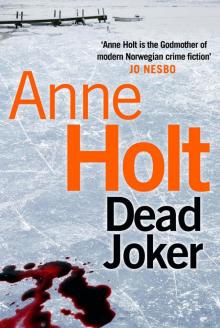 Dead Joker
Dead Joker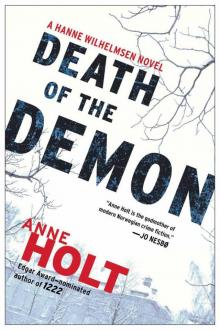 Death of the Demon: A Hanne Wilhelmsen Novel
Death of the Demon: A Hanne Wilhelmsen Novel Punishment aka What Is Mine
Punishment aka What Is Mine Beyond the Truth
Beyond the Truth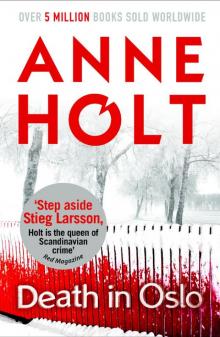 Death in Oslo
Death in Oslo The Blind Goddess
The Blind Goddess What Never Happens
What Never Happens 1222
1222 In Dust and Ashes
In Dust and Ashes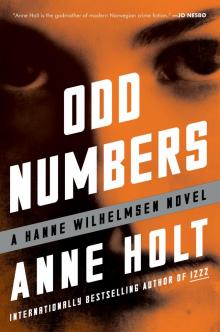 Odd Numbers
Odd Numbers What is Mine
What is Mine What Dark Clouds Hide
What Dark Clouds Hide Blessed Are Those Who Thirst
Blessed Are Those Who Thirst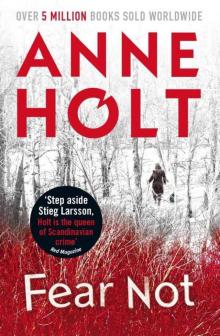 Fear Not
Fear Not No Echo
No Echo Hanne Wilhelmsen - 01 - The Blind Goddess
Hanne Wilhelmsen - 01 - The Blind Goddess